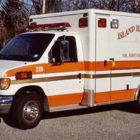
Apr 24, 2017
As I said in last week’s article about Bob Harper, I am kind of playing catch up with a lot of topics, this being one of them. In late 2016, the State of Rhode Island announced publicly that on March 1 of this year, there would be a significant protocol change to their cardiac arrest protocols. Crews would be expected to remain on scene for 30 minutes prior to being transported. Topically, I applaud Rhode Island’s Department of Health for being as public and transparent as they were about this change. Anybody who has been in the field for even a modest amount of time has been on a scene where they were asked “why aren’t you just taking them to the hospital?” In some cases, there is some merit to that. In some cases there is very little that we as paramedics and EMTs can do for a patient on a scene. Cardiac arrest is not one of those emergencies. I saw some pushback online from some who consider themselves experts on the topic, but that’s neither here nor there. One common complaint that I saw revolved around scene safety. Obviously, scene safety trumps all. If I am coding someone in the middle of a street with an aggressive or growing crowd, I am going to think about moving. But on these calls are the exception to the rule, and on the vast majority of runs, even in the worst areas of someone’s coverage area, communication with families goes a long way. “We are doing everything for them right here that they would get in the emergency room. It is their best chance to survive.” That’s the common statement that I have made a number of times to families of patients in cardiac arrest. Maybe those dissenters failed to read the protocol, it states “Regardless of proximity to a receiving facility, absent concern for provider safety, or traumatic etiology for cardiac arrest, resuscitation should occur at the location the patient is found.” Emphasis is mine. Most of the write ups that I read from the online blogging community were written on or around the month of December. It is certainly possible that the...





